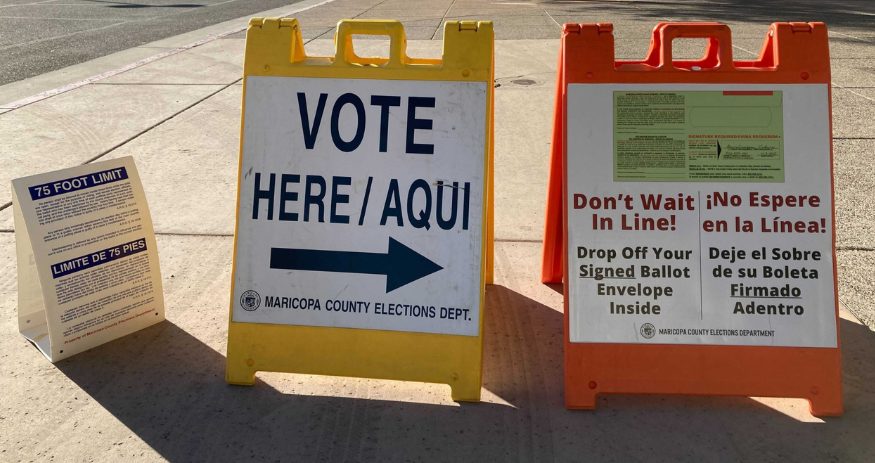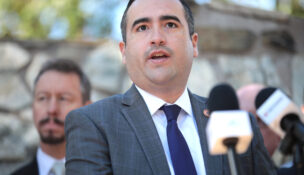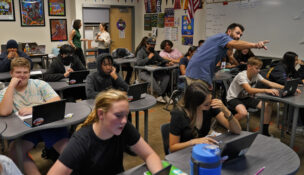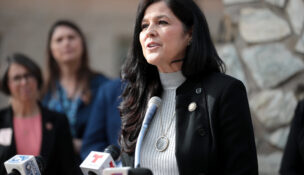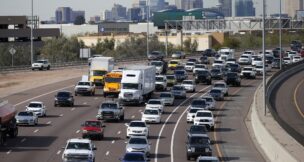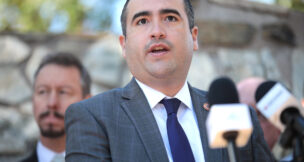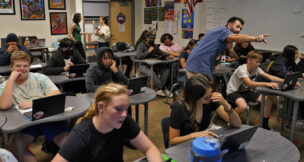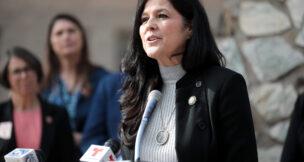Donald Trump-backed SAVE Act elevates noncitizen voting claims, but experts say it’s rare
Mia Osmonbekov Cronkite News//October 7, 2024//
Donald Trump-backed SAVE Act elevates noncitizen voting claims, but experts say it’s rare
Mia Osmonbekov Cronkite News//October 7, 2024//
WASHINGTON – The threat of a government shutdown thrust noncitizen voting, a long-standing Arizona political flashpoint, into the national spotlight after House Speaker Mike Johnson paired the government funding package with a controversial election integrity bill.
Backed by former President Donald Trump and four U.S. House representatives from Arizona, the Safeguard American Voter Eligibility (SAVE) Act would require proof of citizenship to register to vote in federal elections.
Although Congress passed a new spending package without the SAVE Act, its original inclusion points to the popularity of voter-fraud narratives this election cycle. Noncitizen voting as an element of voter fraud has been a contentious issue in Arizona, a state President Joe Biden won by 10,000 votes in 2020.
In Arizona, Republicans trying to crack down on the specter of noncitizen voting is nothing new, despite multiple studies showing that it’s rare. Arizonans passed a ballot measure in 2004 that required voters to show proof of citizenship before registering to vote in order to cast a “full ballot” that includes federal, state and local elections. Without proof of citizenship, they have to attest under penalty of perjury that they are citizens and can then receive a federal-only ballot.
But Arizona Republicans briefly changed their tune on enforcing proof of citizenship to cast a ballot when a database error could have disenfranchised roughly 98,000 voters – mostly registered Republicans – from local and state elections. That number has since more than doubled to 218,000. The Arizona GOP initially joined Democratic Secretary of State Adrian Fontes in urging the state Supreme Court to keep full ballot access for these voters.
“Nearly 100,000 Arizona voters should not be penalized for a mistake made by the government. We will not stand by as voters are disenfranchised, especially so close to an election,” said Republican Party Chair Gina Swoboda in a Sept. 18 news release, before officials announced there were additional affected voters.
The court ruled in their favor, permitting the voters to have full ballot access.
Fontes announced Monday the number of voters with unconfirmed citizenship doubled to more than 200,000, and the brief moment of allyship with the GOP ended with Swoboda criticizing Fontes for not being “as forthcoming with Arizonans as we would have hoped,” according to the Associated Press.
Noncitizen voting is used to mobilize right-wing bases while preventing some demographics from voting, according to Ron Hayduk, a political science professor at San Francisco State University. He pointed to a “concerted effort” by the right-wing Only Citizens Vote Coalition, which has pushed for the SAVE Act and has claimed the 2020 election was stolen, to bring out the “anti-immigrant vote.”
“It continues to raise the idea that there is vote fraud and this is the solution,” Hayduk said, noting it promotes the narrative “that Biden and (Kamala) Harris are letting immigrants into the country to steal the elections from the Republicans, the rightful citizens. … So it does increase turnout and keeps this myth alive.”
A 2017 study from the progressive Brennan Center for Justice analyzed 42 jurisdictions in charge of tabulating 23.5 million votes in the 2016 presidential election and found that improper noncitizen ballots made up just 0.0001% of votes in those jurisdictions. The libertarian Cato Institute similarly called claims of widespread noncitizen voting “bogus” and “sensational.”
But Trump has continued to push a narrative of Democrats letting in noncitizens to vote en masse illegally, even urging Republicans to either pass the SAVE Act with the funding bill or let the government shut down.
“Our elections are bad,” Trump said during the Sept. 10 presidential debate. “And a lot of these illegal immigrants coming in, they’re trying to get them to vote. They can’t even speak English. They don’t even know what country they’re in practically. And these people are trying to get them to vote. And that’s why they’re allowing them to come into our country.”
Though the research consensus is that noncitizen voting is rare, one 2014 study resurfaced during a Sept. 10 House Judiciary Committee hearing presenting the problem as small but still significant. Conducted by Jesse Richman, a professor at Old Dominion University, and two colleagues, the study was first invoked by Trump to falsely claim that millions of noncitizens voting in the 2016 election was why he lost the popular vote.
Richman’s work sparked controversy in political science circles, criticized for its methodology, but he said politicians either unfairly condemn or weaponize his results rather than approach the issue in a balanced way.
“I disagree with Democrats and others who say that there’s no evidence of noncitizen voting. On the other hand, I disagree with Republicans who think that noncitizen voting is the monster that’s eating their democracy,” Richman said.
Hayduk said Republicans rely on the 2014 study to fuel exaggerated narratives about noncitizen voting.
“(Republicans) want to keep elevating this study that has been debunked because it tells the story that they want to tell,” Hayduk said. “It’s kind of perplexing and infuriating that these studies are continuing to get oxygen and that this narrative of the myth of vote fraud continues.”
The SAVE Act, which has passed the U.S. House of Representatives, “creates unnecessary barriers” for voters, according to ACLU of Arizona policy strategist Katelynn Contreras.
“When an individual registers to vote in the United States, they already kind of have to prove their citizenship through obtaining a driver’s license or providing their tribal ID number,” Contreras said. “Putting the burden of proof on the person is a bit onerous when the government does have access to a whole plethora of databases to check on their end if an individual is a citizen.”
Experts say certain groups are more affected by these barriers than others – students, Native Americans, low-income individuals, older adults and people of color, particularly Latinos.
“The rhetoric surrounding voter fraud not only inflames these tensions but also places a target on the backs of all Latinos and people of color,” said Monica Sandschafer, the Arizona director of advocacy group Mi Familia Vota, in an emailed statement.
Mi Familia Vota and other civil-rights groups had sued Republicans over two 2022 state laws – House bills 2492 and 2243 – which required Arizonans to disclose their place of birth, provide proof of citizenship for federal elections and required county recorders to cancel votes if they had reason to believe the voter wasn’t a citizen. Some provisions were struck down, but the case is ongoing.
For more stories from Cronkite News, visit cronkitenews.azpbs.org.

